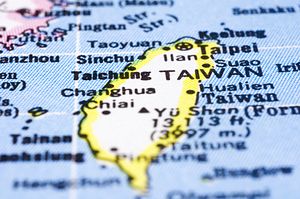Disclosure: The author is an employee of the Thinking Taiwan Foundation, a think tank launched by Tsai Ing-wen in 2012. The views expressed in this article are the author’s alone and do not necessarily reflect the official positions of the institutions with which he is affiliated.
As Taiwan’s 2016 presidential election approaches, the issue of the “1992 Consensus”—whether it exists, who signed it, who recognizes it, and how indispensible it is to cross-strait relations—has once again become the subject of heated debate. President Ma Ying-jeou, who has made the alleged consensus a cornerstone of his administration, has contended on a number of occasions, and did so again last week, that Beijing, Taipei, and the U.S. recognize its existence. Whether the construct actually exists or not is debatable. However, one thing that is certain is that Ma is being disingenuous when it comes to U.S. views on the matter: Washington does not recognize the 1992 Consensus—its official position is that it has “no position.” This may seem like a small thing, but it makes a big difference.
With the opposition Democratic Progressive Party (DPP) unwilling to embrace it, the “consensus” has become a handy tool for the Chinese Nationalist Party (KMT), which has long positioned itself as the party that is best able to handle relations across the Taiwan Strait in a peaceful and constructive manner. According to the KMT’s logic, the DPP’s refusal to recognize the consensus (in large part due to its presumption of “one China”) signifies that the latter is insincere in its desire to cultivate ties with Beijing (the KMT’s official line on the consensus is “one China” with different interpretations of what “one China” means, a precision that is evidently left out by Beijing). Also implied is that a DPP victory in January 2016 would mean a return to an atmosphere of contention and instability in the Taiwan Strait.
Attendant to such perceptions is the belief that the U.S., which ostensibly puts a premium on stable relations in the Taiwan Strait, would pressure the DPP to adopt the 1992 Consensus, or conversely that it would “punish” it for refusing to do so. Needless to say, this theory relies on the assumption that Washington in fact recognizes the existence of the so-called consensus. Sadly for Ma, it doesn’t. This doesn’t mean that the U.S. will not lean on the DPP to ensure stable cross-strait ties. But the notion that Washington would pressure a DPP candidate or administration to embrace the 1992 Consensus, or that such leverage could help the KMT (and Beijing), does not align with the facts.
The idea that the U.S. would do so has nevertheless gained some acceptance. I myself hinted at this possibility in a previous article and was quickly corrected by a prominent American academic. Commentaries by former U.S. officials to the effect that the Consensus has been a “useful enough” a formula for the advancement of cross-strait relations may have played a role in creating such impressions, though such conclusions stem from a misreading of the former officials’ remarks.
More pointedly, on at least two occasions President Ma has stated that the 1992 Consensus was recognized by Washington: In an interview reported by the United Daily News on December 23, 2010, in which he said that the DPP was the only one of four parties (the others being the “mainland,” the Republic of China and the U.S.) that did not recognize the consensus; and last week during the awkwardly named “International Conference on Retrospect and Prospect on Cross-Strait Relations” organized by the Mainland Affairs Council and the Foundation on Asian-Pacific Peace Studies (“mainland China and the United States both recognize the ‘1992 Consensus’”).
As Shirley Kan, a meticulous specialist in Asian security affairs at the Congressional Research Service, wrote in a recent report, Ma’s characterization of Washington as recognizing the 1992 Consensus is misleading. “[C]ontrary to Ma’s characterization of U.S. policy as recognizing the ‘1992 Consensus,’ the State Department told Taiwan’s Liberty Times on December 28 that: ‘Questions relating to establishing the basis for dialogue between Taiwan and the People’s Republic of China are matters for the two parties to resolve. The U.S. takes no position on the substance of such questions. Our interest is that any resolution of cross-strait issues be peaceful.’” [Italics added.]
Ma told the same conference that during a phone conversation between then-presidents George W. Bush and Hu Jintao that allegedly took place four days after Ma was elected president in 2008, Hu proposed that the 1992 Consensus be used as a platform to restart “stalled” cross-strait relations after eight years of DPP rule. According to Ma, the conversation was “proof” that the U.S. recognizes the Consensus.
Echoing Ms. Kan’s report, the American Institute in Taiwan (AIT) spokesman quickly rebutted Ma’s claim by saying that “the U.S. takes no position on the substance of such matters.”
It is important that we understand what the official U.S. position is on the 1992 Consensus, and that Washington officials be consistent in their comments on the subject. Washington’s “non position” on the Consensus demonstrates that the U.S. is not so much interested in form but rather hopes to see substance in cross-strait relations. By clearly stating that adherence to the 1992 Consensus is not the only option or a prerequisite for its support, Washington can reduce the likelihood that the Consensus will be used as a weapon by the KMT and Beijing against the DPP candidate in the lead-up to the January 2016 elections.
The U.S. and the international community should not let rigid and highly symbolic frameworks imposed by Beijing undermine the development of cross-strait ties or put a political party at a disadvantage. In other words, if the DPP offers a reasonable formula for dialogue with Beijing, one that focuses on substantive exchanges, then it should receive Washington’s full blessing, regardless of the name that is used to describe the process.

































